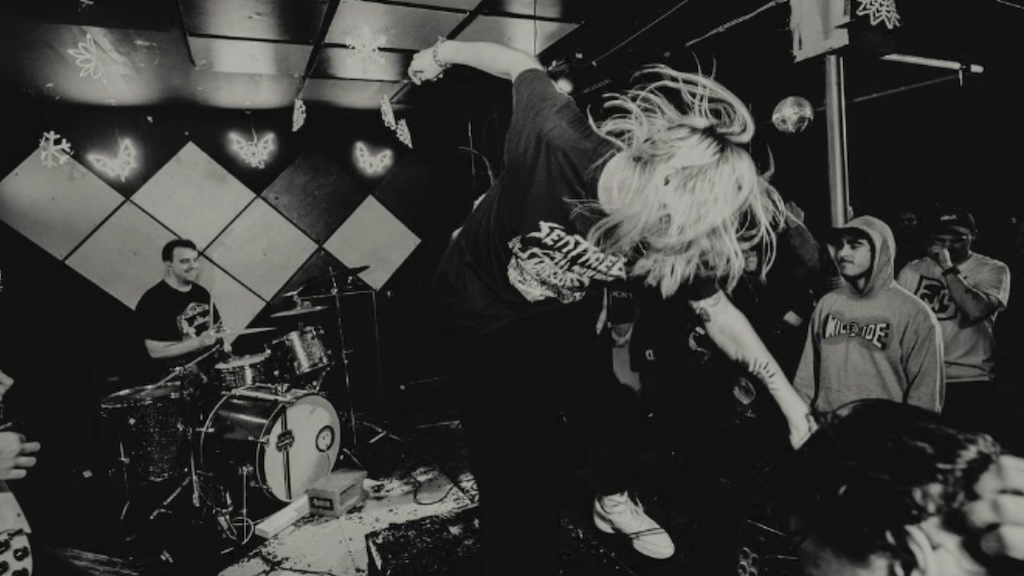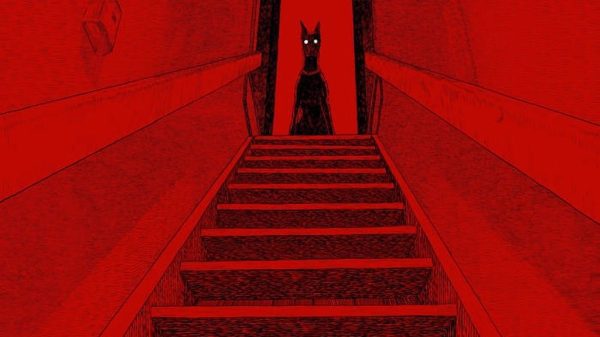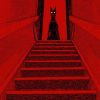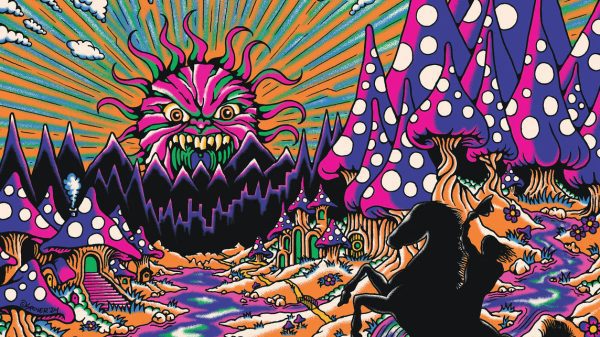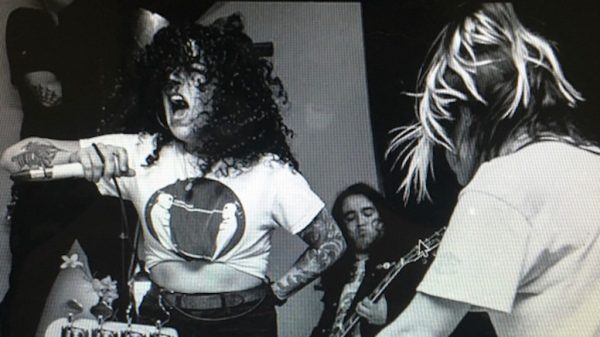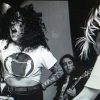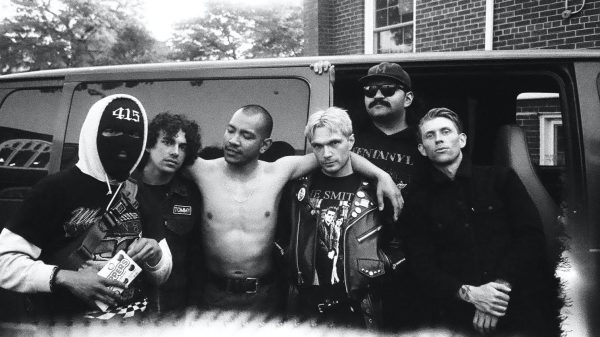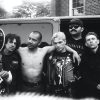Destiny Bond is going to save lives.
It is rare that a band manages to capture so perfectly, so passionately, so painfully, the deep angers and anguishes of an entire generation. With heartfelt sincerity, incendiary energy, and deeply personal lyrics, the band has quickly established a large and committed base of fans who have been waiting for an artist like this to be their voicebox.
While, on a musical and lyrical level, the band’s most recent release, Be My Vengeance, feels extremely current and personal, it is also timeless and universal. It exhibits the very best of what catchy punk and post-punk have to offer right now, covering an amazing amount of creative ground without ever sounding like the band has lost their individual stylistic center and without ever sounding enough like anyone else to draw very strong comparisons. In an increasingly quantized musical landscape, Destiny Bond’s jangly, open-chords ring out over a rhythm section driven by heart rather than data. The result is an overall sound that shows the listener what the garage rock revolution of the 00’s could have been if it stuck to its principles rather than being swept up by big music labels.
Be My Vengeance is an album featuring hit after hit, but a few stand out as especially worth exploring here. It all starts with the age-transcending “Chew,” an understated treatise on authoritarian moralizing and conservative control apparatuses. The track begins with a laissez faire punk attitude, asking probing rhetorical questions. Largely maintaining a pulse-matching tempo, and allowing chords to ring out and decay, the song is the perfect opening to a perfect album. It boasts plenty of breathing room, inviting the listener in, creating space, and, as soon as the lyrics change turn to incredulity and fury, the instrumentation implodes into a pressurized zone of righteous indignation, with faster tempos, minor chord phrasing, and pugilistic palm-muting.
The lyrics of “Kinetic” are destined to be written on mirrors and tattooed on bodies. With open-chord voicings, heavy-picked bass rumbles, and irresistable pogo rhythms, the song is an anthem of uplift and validation. Cloe Madonna’s shouts, never sacrificing emotion for power, plays the role of the exact voice we all want to internalize in our darkest times, a mindful voice that can overtake our own drives to self-destruct: “It’s not a wasted life. Pick yourself up off the floor . . . Your potential is pouring baby . . . Take a breath, take a look, take a moment to feel . . . You’re taking on the world pound for fucking pound.”

“Mosaic” and “The Glow” serve as an ideal combined centerpiece of the album, capturing the justified rage and the effervescent joy that balance this collection so beautifully. “Mosaic” is a rabid screed against all the forces in the world–and in ourselves–that seek to categorize us, to box us in, to make us fit their mold. The song is seething, firey, and painful, which is fitting, as it describes processes of destroying and remaking the self, of molting and being made new. “The Glow” is a song played during the credits of the indie film you needed to see as a teenager, the film that reminded you that, no matter what your teachers or priests or parents say, there’s never been anything wrong with you, that there are people who will love you just as you are.
Feminist movements in the 1960s popularized the phrase “The personal is political,” and while punk has always had a way of making everyone in the audience feel as though each song was about them, one of the things that makes this release such a step forward from Destiny Bond’s already brilliant demo is the band’s willingness to get into the particulars. In this historical moment, there is no kindness in equivocation, no generosity in generalities; it’s time for direct speech that can lead to direct action. “Blood Chokes” is purging a very specific pain, celebrating a very specific selfhood, and speaking to a very specific family. “This is for all the trans kids! You’re mine! You’re mine! On my heart all the time!” This is personal-but-political, private-but-shared, and Cloe is crying out to the sky inviting all those trans kids who haven’t found their voice to scream at the stars.
“Feeling the pain of a new beginning, not breaking but learning to bend . . . You’re coming free . . . You’re coming home . . . You’ve had this from the start.” Album closer, “Harmony” an indisputable dancer of sweaty hug-moshing is a theme song for the youth, but equally, it’s a song to heal that still-hurting inner-child in each of us. It’s never too late to realize that, if you don’t fit in with a broken world, it doesn’t mean that you’re broken too.
Destiny Bond’s drummer, Adam Croft, describes some of the band’s artistic forebears as “catchy, undeniable,” and those descriptors unequivocally apply to Destiny Bond’s output. Like Blitz, like The Faith, like The Ramones, like The Buzzcocks, this band’s influence will long outlast its activity, though for all of our sakes, we hope the band is not going to hang it up for a long while. And if Destiny Bond’s music is undeniable–and it is–their messaging is incontrovertible, and urgent.
Sneak copies of Be My Vengeance into every lonely kid’s cellphone.
Truly, Destiny Bond is going to save lives.
Destiny Bond talked to CVLT Nation about the band and about Be My Vengeance.
First, can you introduce the members of the band and any other projects they’d like to promote?
Destiny Bond is Emily Armitage on Guitar, Adam Croft on drums, Amos Helvey on guitar, Cloe Madonna on vocals, and Rio Wolf on bass. Adam also plays in a post punk band called Tender Object, Cloe plays in a dream pop band called Cherished, and Amos makes experimental folk music as Flaming Tongues Above.
The band formed in 2021, featuring established musicians from the Colorado and Wyoming music scenes. Can you talk a bit about the group’s initial goals?
Adam: I think our initial goals were to highlight a style of early hardcore and punk we enjoy. Amos and I would have these really long text conversations before and during COVID and around the start of the band about bands like The Faith, Slapshot, and Dag Nasty and that really felt like the start of carving out some sonic goals. I think other than that the goals of the band were to play locally, do some touring, put out a record, maybe a couple records. The goals every band has.
Amos: Our initial goal was to play fast and have fun. We wanted to make kinetic music that incorporates elements of a lot of things we enjoy.
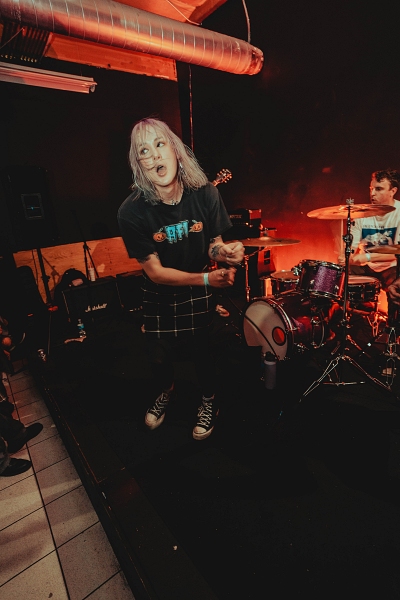
How has the group’s vision and sound developed in the time between its demo and Be My Vengeance?
Adam: I mean a lot of the material on the LP is material that’s been kicking around since the demo but I think I’m a much better drummer since the demo, so that’s one development.
Amos: We’re constantly trying to push in multiple directions at once. Though some of the songs sound different from one another I believe they contain a common thread and the way they contrast with each other elevates the album or live set as a whole. Of course, it’s up to the listener to decide if they agree or if they think it is an unfocused mess.
Cloe: Sound wise, I think we opened up more to mixing in some lighter sounds and living in that middle ground rooted in punk and hardcore. For my vocals, I was trying out some different vocal ideas for the demo and promo. I kept tweaking it so by the time the album came around I’d found the voice I wanted. I’d say the vision of the band is still the same as it was initially, but touring and recording has made us more confident and given us a better understanding of how we want to go about achieving it.
Can you talk about the writing process for Be My Vengeance? Who were some of the major musical influences?
Adam: Our writing process is pretty straightforward – Amos usually brings in a mostly finished song outline and we work with it as a band. Sometimes we make tweaks but we mostly go from his blueprint.
Amos: I demoed some of the songs in my bedroom in 2020, some were from before that and some came afterward. Some important musical influences from around that time, aside from those Adam has already mentioned, are Government Issue, Jerry’s Kids, JFA, Raw Power, Poison Idea, Discharge, The New York Dolls, The Ramones, AC/DC, T Rex.
Cloe: I wrote the lyrics at practices where I’d let the songs influence the feel of what subjects and energy could fit best, mixed with what was going on my mind at the time. From there I’d start writing on whatever idea from scratch or sift through my notes app for relevant unfinished lyrics I’d put in over the past half decade or so. Some of my influences were Kid Dynamite, Cerce, Give, Punch, and The Distillers.
How has being in Denver around so many amazing punk and hardcore bands contributed to the band’s sound? Is it difficult to find a new sound when surrounded by so many diverse and excellent artists?
Adam: I think it’s inspiring in the sense that being around bands you love can move you to want to make something to begin with. That’s how Denver feels. The community of hardcore and punk bands is second to none. I don’t really worry too much about finding a new sound or standing out – I think that just happens by default if you’re authentic and this band has always felt that way. Maybe we pull from different influences or something, but I really just take solace in the fact that we’re being ourselves and playing hardcore music the way we like to play it so naturally it won’t be the same as the way anyone else goes about it. And I think Denver is full of bands that are distinctive because what they’re making is authentic, which also creates an environment of mutual respect. We all recognize everyone is in their lane because it’s genuine and rewarding to them and that makes for a healthy community of bands I think.
Amos: Being around good bands is a great motivator to be the best band we can be.
Cloe: It’s really amazing and also almost daunting how many incredible bands we’re surrounded by right now. I’ve learned so much watching and listening and talking with them and it definitely contributes to everything I do in this band.
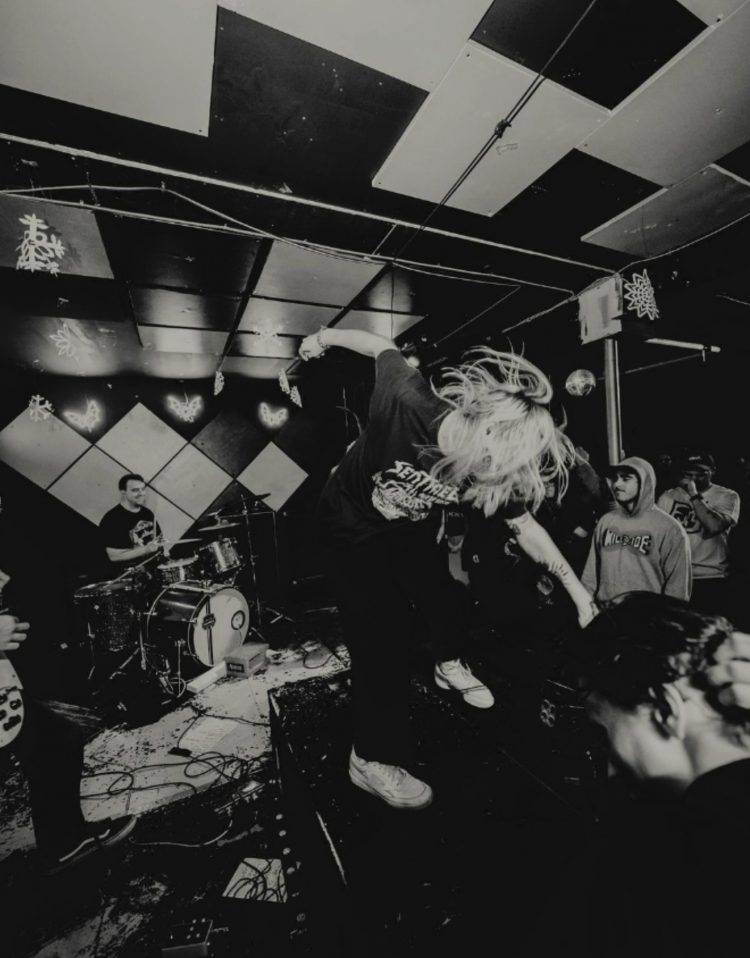
The lyrics on this LP involve very personal reflections as opposed to abstract “overarching themes.” Many of them deal with resilience, mutual aid, collaborative community building, self-identity, and transcending obstacles. The vulnerability in these lyrics is especially valuable but unfortunately rare in hardcore. I think this is part of what has made the band so meaningful to listeners. What is the role of personal disclosure in your songwriting? Do you think these topics, although specific to your lived experience, touch on something universal for your audience?
Cloe: That “overarching themes” line in Headspin is about the frustration of feeling like my lyrics were always too abstract and obscure in other projects, and how I never felt like I properly communicated the messages I wanted to. I started to realize that through being fully honest and personal about what I was feeling, it brought about a new urgency to what I wrote, and I no longer felt like I was concealing myself. And while I was writing about intense changes and challenges in my own life, no matter who you are, we all have those, so I wanted the theme to be “I can do this, you can do this, there’s a way through and we can make it together”. The people in my life have done so much to help shake me out of getting isolated and lost in my own world, and so I hoped screaming about those things could maybe break through to people feeling a similar way. I think that message is relatable, even for those who share little in common with my own life.
There seems to be a move in hardcore toward incorporating more melody, which is something Destiny Bond does exceedingly well. To what do you credit this shift toward catchier, more singable songs? And how have shows been when on a bill with angrier, less melodic bands?
Adam: I think if melodic, catchier hardcore and punk music is having a moment it’s because the influences that get you there are undeniable and will always come in and out of vogue. Great songs are timeless whether or not it’s aggressive hardcore or punk music. The Faith wrote catchy, undeniable songs. Blitz wrote catchy, undeniable songs. It’s inevitable that generations to come would be enamored with that kind of songwriting and try to put their own spin on it. It’s like gravity – great songwriting will always pull the next generation in.
Amos: I don’t know what to give credit for a wave of more melodic bands, but melody is one of the most central aspects of most rock music, so it makes sense to me that bands would like to explore that in addition to stomping, blasting and whatnot. Singing and humming along to music is evergreen.
Playing shows with more aggressive, or heavier and moshier bands has been, by and large, a positive experience. We like a lot of heavy and hard music that doesn’t always go into our music as a direct influence and I’ve found that people who play in heavy and hard bands are often the same way but in reverse. I don’t always want to play with bands who share our influences and wall ourselves off in that space. I enjoy playing varied bills with good bands who play different types of music.
What do you love about punk and hardcore right now? What should change? To the latter, can you offer any solutions?
Adam: I love that it seems to be a youth culture right now more than any other time in my life. Some people want to call that “tik tok hardcore” or whatever and complain, but I think hardcore is at its best when it’s a youth culture. I’ve been to plenty of shows where everyone is 27-33 years old and their arms are crossed for every set. Miss me with that. That’s not to say that older people shouldn’t be in hardcore or whatever. I’m about to turn 30. Intergenerational community is also an amazing aspect of this music. But the current moment is especially great because young kids seem to be figuring out who they are in the context of hardcore which is what this music is for, from its origin. When I found hardcore I was just a ball of enthusiasm with nowhere to go. Hardcore helped me figure out who I was, what I was capable of, what I was good at, how to be a part of a community, how to make things. And I see more young kids than ever going through that process. For some of them it goes further and seems to be about identity and representation and learning who they are in that sense and I think that’s beautiful too. I see a lot of concern that this generation are just tourists or whatever but every generation has people that enjoy hardcore for a little while and move on. I’m glad these kids will have been involved in something positive even if they move on. And I’m willing to bet a lot of them won’t.
Cloe: I think the wide variety of sounds and expressions from the bands playing to the people showing up is so exciting. There’s so much room for everything, and the further the boundaries are pushed in hardcore, the better off it is. The thing I would change would be eradicating the jaded and stand-offish attitudes from the scene, but I think that’s already shifting as I see more enthusiasm everywhere and the negativity largely seems to stay in easy-to-ignore corners of the internet.
What should people know about Destiny Bond? About Be My Vengeance?
Cloe: Come find out about us at a show! We’re just a band of people who have spent decades being excited about music and the community it creates, and Be My Vengeance is a love letter to that idea. If you’re here for us, we’re here for you.
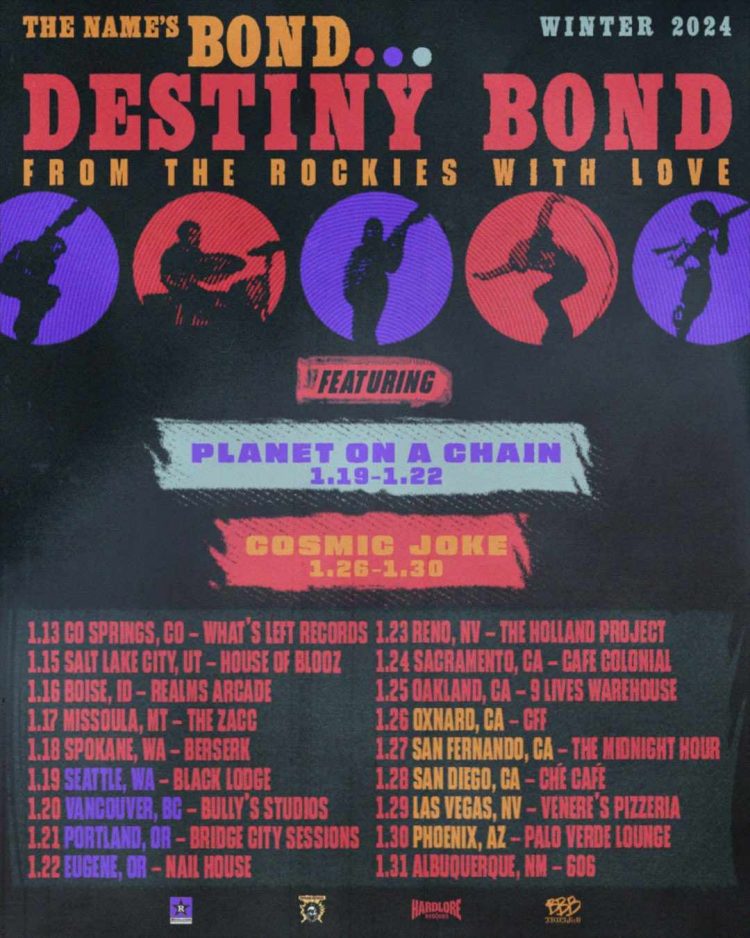
See the band on their current tour, and pick up Be My Vengeance at Convulse Records.

